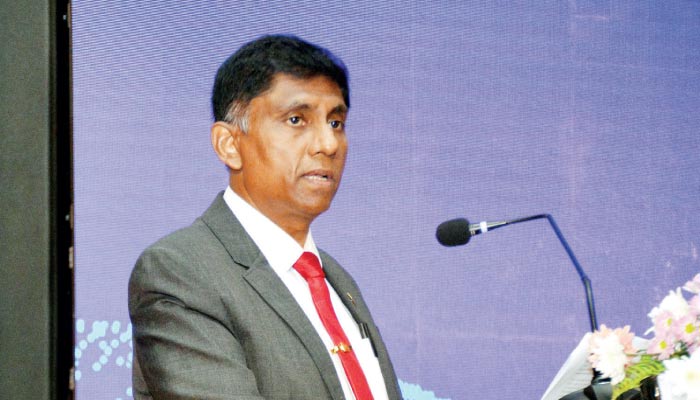Monday Feb 23, 2026
Monday Feb 23, 2026
Monday, 21 April 2025 01:54 - - {{hitsCtrl.values.hits}}

Environment Ministry Secretary K.R. Uduwawala – Pic by Upul Abayasekara
By Janani Kandaramage
Environment Ministry Secretary K.R. Uduwawala recently declared that Sri Lanka’s transition to a green economy is steadily gaining momentum, but lacks adequate sustainable finance to deliver on its lofty ambitions in the immediate future.
Speaking at the launch of the AgriFI Sri Lanka Country Window organised by the European delegation to Sri Lanka and the Maldives, he acknowledged the Government’s commitment to inclusive green development, listing a series of national policies aimed at accelerating renewable energy, sustainable agriculture, and circular economic practices.
However, he noted that implementation remains constrained by inadequate financial support, highlighting that: “The Green Sri Lanka initiative is not just an idle aspiration, it is a reflection of our strategic commitment to balancing economic prosperity with environmental stewardship.”
He added: “But this transition cannot happen in isolation. It demands robust financing mechanisms and persistent collaboration across all sectors, ranging from private and public enterprises, the agricultural labour force, Small and Medium-sized Enterprises (SMEs), and international environmental regulatory bodies, as well as the local ones.”
Despite the existence of a comprehensive policy framework in the National Environmental Action (NEA) Plan, the Net Zero 2050 strategy, and Green Procurement Policy, he insists that they remain underfunded, deterring prompt action in the form of concrete steps.
“These strategies have been limited from achieving their full potential owing to our ongoing debt crisis and financial instability, which hindered a lot of investment in environmental initiatives as well as the availability of domestic funds for these initiatives. Other challenges include institutional weaknesses and some policy uncertainties, which are in the midst of being addressed by our Government,” he opined.
He commended the European Union’s support for these efforts since the launch of the Green Policy Dialogue Facility (GPDF) in 2022, directed at bridging gaps in funding and supporting policy execution.
The GPDF, he explained, strives to mainstream inclusive green economy objectives across Sri Lanka’s governance and economic systems. Its key objectives are to support inclusive policy development, improve the investment climate for circular industries, and expand access to green finance – advantageous to the nation’s aspirations, “but still inadequate,” he asserted.
The Secretary also pointed out that Sri Lanka is positioned to emerge as a model of resilient economic growth, especially as global economies recalibrate towards low-carbon and responsible business practices.
“The path to a green economy is not just about policies – it’s about unlocking investment in innovation, SMEs, and sustainable industries,” he stressed. “To draw in investment, strengthening the country’s macroeconomic indicators in the present is important, and therefore, it is at the forefront of our administration’s priorities.”
Outlining the broader role of financial institutions, the private sector, and development partners, he called for an integrated investment framework that places checks and balances on business practices, ensuring accountability and transparency.
“Environmental, social, and governance (ESG) principles must be embedded into financial decision-making in all enterprises to ensure long-term economic development,” he said, adding that aligning with global standards will drive greater investment to clean energy and eco-friendly industries, while driving green financing opportunities.
The Secretary also cited the lack of sufficient technical expertise as a common concern among local stakeholders, emphasising the importance of knowledge sharing and public-private cooperation in realising Sri Lanka’s green economy vision.
“Our collective commitment to sustainable finance will define the success of this transition,” Uduwawala remarked, urging stakeholders to contribute ideas that could be transformed into tangible progress.